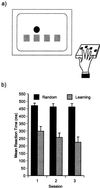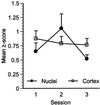Experience-dependent changes in cerebellar contributions to motor sequence learning
- PMID: 11805340
- PMCID: PMC117423
- DOI: 10.1073/pnas.022615199
Experience-dependent changes in cerebellar contributions to motor sequence learning
Abstract
Studies in experimental animals and humans have stressed the role of the cerebellum in motor skill learning. Yet, the relative importance of the cerebellar cortex and deep nuclei, as well as the nature of the dynamic functional changes occurring between these and other motor-related structures during learning, remains in dispute. Using functional magnetic resonance imaging and a motor sequence learning paradigm in humans, we found evidence of an experience-dependent shift of activation from the cerebellar cortex to the dentate nucleus during early learning, and from a cerebellar-cortical to a striatal-cortical network with extended practice. The results indicate that intrinsic modulation within the cerebellum, in concert with activation of motor-related cortical regions, serves to set up a procedurally acquired sequence of movements that is then maintained elsewhere in the brain.
Figures




References
-
- Bloedel J R. Behav Brain Sci. 1992;15:666–678.
-
- Bloedel J R, Bracha V, Milak M, Shimansky Y. Prog Brain Res. 1997;114:499–509. - PubMed
-
- King D A, Krupa D J, Foy M R, Thompson R F. Int Rev Neurobiol. 2001;45:313–337. - PubMed
-
- Doyon J. In: The Cerebellum and Cognition. Schmahmann J D, editor. San Diego: Academic; 1997. pp. 273–294.
-
- Thach W T. Trends Cogn Sci. 1998;2:331–337. - PubMed
Publication types
MeSH terms
LinkOut - more resources
Full Text Sources
Other Literature Sources

